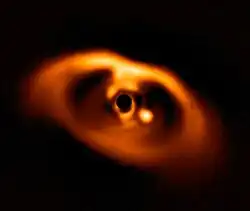| Discovery | |
|---|---|
| Discovered by | Ofir et al. |
| Discovery date | 8 October 2013 |
| Transit (Kepler Mission) | |
| Orbital characteristics | |
| 0.664 AU (99,300,000 km) | |
| Eccentricity | 0.039 |
| 191 d | |
| Inclination | 89.588 |
| Star | Kepler-87 (KOI-1574) |
| Physical characteristics | |
Mean radius | 6.14±0.29 R🜨 |
| Mass | 6.4±0.8 MEarth |
Mean density | 0.152 g/cm3 (0.0055 lb/cu in) |
| Temperature | 400 |
Kepler-87c is a planet orbiting Kepler-87, a star slightly more massive than the Sun and nearing the end of its main-sequence period. [1]
Characteristics
Despite being larger than Neptune, Kepler-87c is only about 6.4 times more massive than Earth. This means that its density is only 0.152 g/cm3. This is the first planet with a comparable mass to have such a low density. Its equilibrium temperature is 130 °C.[2]
References
- ↑ "The Extrasolar Planet Encyclopaedia — Kepler-87c". Extrasolar Planets Encyclopaedia. Retrieved 10 September 2023.
- ↑ Ofir, Aviv; et al. (2014). "An independent planet search in the Kepler dataset. II. An extremely low-density super-Earth mass planet around Kepler-87". Astronomy and Astrophysics. 561. A103. arXiv:1310.2064. Bibcode:2014A&A...561A.103O. doi:10.1051/0004-6361/201220935. S2CID 118691606.
External links
This article is issued from Wikipedia. The text is licensed under Creative Commons - Attribution - Sharealike. Additional terms may apply for the media files.



